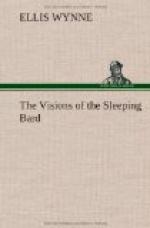The stormy blast of Hell
With restless fury drives the spirits on:
When they arrive before the ruinous sweep
There shrieks are heard, there lamentations, moans,
And blasphemies.
- Dante: Inf. c. V. (Cary’s trans.).
{73a} Amidst eternal ice.—Cp.:
Thither . . . all the damned are brought
. . . and feel by turns the bitter change
Of fierce extremes, extremes by change more fierce!
From beds of raging fire to starve in ice
Their soft ethereal warmth, and there to pine
Immoveable, infix’d and frozen round
Periods of time; thence hurried back to fire.
- Par. Lost, II. 597-603.
{85a} Better to reign.—This speech of Lucifer is very Miltonic; compare especially —
—in my choice To reign is worth ambition, though in hell; Better to reign in hell than serve in heaven.
- Par. Lost, I. 261-3.
{85b} Revenge is sweet.—Cp.:
Revenge, at first though sweet
Bitter ere long, back on itself recoils.
- Par. Lost, IX. 171-2.
{87a} This enterprize.—Cp.:
—this enterprize None shall partake with me.
- Par. Lost, II. 465.
{95a} Barristers.—The word cyfarthwyr, here rendered “barristers,” really means “those who bark,” which is probably only a pun of the Bard’s on cyfarchwyr—“those who address (the court).”
{95b} Sir Edmundbury Godfrey.—A London magistrate who took prominent part against the Catholics in the reign of Charles II. At the time the panic which the villainy of Titus Oates had fomented was at its height, Sir Edmundbury was found dead on Primrose Hill, with his sword through his body; his tragic end was attributed to the Papists, and many innocent persons suffered torture and death for their supposed complicity in his murder.
{102a} Einion the son of Gwalchmai.—This is a reference to a fable entitled “Einion and the Lady of the Greenwood,” where the bard is led astray by “a graceful, slender lady of elegant growth and delicate feature, her complexion surpassing every red and every white in early dawn, the snow-flake on the mountain-side, and every beauteous colour in the blossoms of wood, meadow, and hill.” (v. Iolo MSS.) Einion was an Anglesey bard, flourishing in the twelfth century.
{104a} Walking round the church.—Referring to a superstitious custom in vogue in some parts of Wales as late as the beginning of the present century. On All Souls’ Night the women-folk gathered together at the parish church, each with a candle in her hand; the sexton then came round and lit the candies, and as these burnt brightly or fitfully, so would the coming year prove prosperous or adverse. When the last candle died out, they solemnly march round the church twice or thrice, then home in silence, and in their dreams that night, their fated husbands would appear to them.
{106a} Cerberus, et seq.—Compare the seven deadly sins in Langland’s Vision of Piers Plowman, Pride, Luxury (lecherie), Envy, Wrath, Covetousness, Gluttony, and Sloth. See also Chaucer’s Persones Tale, passim. A description of these seven sins occurs very frequently in old authors.




